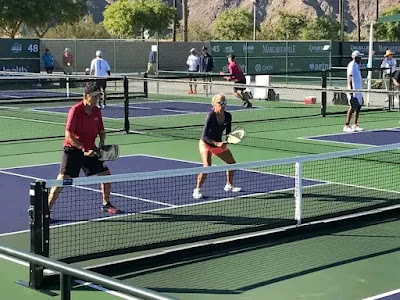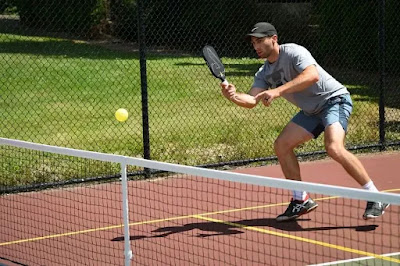8 Essential Tips to Defend effectively in pickleball
Pickleball is a fascinating and engaging sport that combines elements of tennis, badminton, and table tennis. It's an excellent game for people of all ages and abilities, making it a popular choice for recreational and competitive play. However, to truly excel in pickleball, you must master the art of defense.
This article covers five essential tips to help you defend effectively and elevate your pickleball game. By following these tips, you'll improve your defensive skills and become a more formidable and strategic player overall.
 |
| 5 Essential Tips to Defend Effectively in Pickleball |
Tips to Defend Effectively in Pickleball
1. Master the Ready Position
The foundation of a strong defense in pickleball lies in your ability to assume and maintain the correct ready position. Proper posture will allow you to react quickly to any shot and cover a significant portion of the court.
Proper Stance and Footwork
Start with your feet shoulder-width apart, knees slightly bent, and weight on the balls of your feet. This stance will enable you to move quickly in any direction. Additionally, stay light on your feet and be prepared to adjust your position based on the ball's movement.
Paddle Placement
Hold your paddle up and out in front of your body, with the face of the paddle facing your opponents. This position allows you to be prepared for any incoming shot, whether a fast drive or a soft drop shot.
2. Anticipate Your Opponent's Moves
Predicting your opponents' next moves is a crucial aspect of a successful defense in pickleball. This skill comes with experience, but you can also improve your anticipation by observing and analyzing your opponents' playing style.
Recognize Patterns
Look for common shot patterns and tendencies in your opponents' play. Are they consistently hitting the ball crosscourt, or prefer down-the-line shots? By identifying their habits, you can position yourself better to defend against their attacks.
Watch the Ball and Your Opponents
Keep an eye on the ball and your opponents at all times. Observe their body language, paddle position, and footwork. These cues can give you valuable information about the type and direction of their next shot.
3. Control the No-Volley Zone
The no-volley zone, also known as the kitchen, is a critical area of the court in pickleball. Controlling this zone is essential for a strong defense, as it prevents your opponents from hitting aggressive shots at your feet.
Keep Your Opponents Back
One way to control the no-volley zone is to pin your opponents at the baseline. This can be achieved by hitting deep, well-placed shots that force them to stay back and hit defensive shots.
Maintain Your Position
When you find yourself at the no-volley line, hold your ground and don't retreat unless necessary. By staying close to the line, you're better positioned to defend against dinks and drop shots while also being able to attack if the opportunity arises.
4. Develop Your Soft Game
A well-rounded defensive strategy in pickleball involves reacting to your opponents' shots and dictating the pace and style of play. This is where the soft game comes into play, allowing you to control the point and keep your opponents on their toes.
Dink and Drop Shots
Mastering dink shots and drop shots will enable you to slow down the game and force your opponents to play at a more controlled pace. These shots can also draw your opponents into the kitchen, creating opportunities for you to attack.
Patience and Consistency
When engaging in a soft game, staying patient and consistent is essential. Focus on keeping the ball in play and waiting for your opponents to make a mistake or allow you to attack. Remember, the goal is to outlast your opponents and maintain control of the point.
5. Improve Your Court Awareness and Communication
Good defense in pickleball often comes down to effective teamwork and communication, especially in doubles play. Enhancing your court awareness and communication skills will help you and your partner cover more ground and defend better against your opponent's attacks.
Know Your Responsibilities
Understand the roles and responsibilities of each player on the court. Familiarize yourself with stacking and know when to switch sides with your partner. By knowing your role, you can ensure that you're covering the right area of the court and not leaving gaps for your opponents to exploit.
Communicate with Your Partner
Effective communication with your partner is crucial for a strong defense. Call out shots, indicate who should take the ball, and discuss strategy during breaks in play. By maintaining open lines of communication, you and your partner will be better prepared to defend as a cohesive unit.
6. Strengthen Your Physical Fitness
Improving your physical fitness can significantly enhance your defensive capabilities on the pickleball court. A higher fitness level will allow you to move faster, change direction quickly, and maintain focus during long rallies.
Cardiovascular Endurance
Incorporate regular cardiovascular exercise into your routine, such as running, cycling, or swimming. This will improve your stamina and allow you to maintain a high level of performance throughout an entire match.
Agility and Speed
Perform agility and speed drills to improve your quickness on the court. Ladder drills, shuttle runs, and plyometric exercises can all help you develop the ability to change direction rapidly and cover more ground defensively.
7. Refine Your Blocking Skills
Blocking is an essential defensive skill in pickleball, particularly when facing hard-hitting opponents. You can neutralize powerful shots and regain control of the point by improving your blocking technique.
Paddle Angle
Pay close attention to the angle of your paddle when blocking. The correct angle will help you absorb the force of the shot and direct the ball back over the net. Experiment with different paddle angles during practice to find what works best.
Soft Hands
Developing soft hands will allow you to absorb the impact of hard shots better and keep the ball in play. Practice taking pace off the ball by relaxing your grip on the paddle and allowing it to absorb the incoming shot's energy.
8. Cultivate Mental Toughness
Developing mental toughness can significantly enhance your defensive abilities in pickleball. A strong mental game will help you remain focused and resilient under pressure, enabling you to make better decisions on the court.
Stay Present
During matches, learn to stay in the present moment and avoid dwelling on past mistakes or worrying about future outcomes. This will help you maintain a clear mind and react effectively to your opponents' shots.
Build Confidence
Cultivate self-confidence by setting achievable goals, reflecting on your progress, and acknowledging your successes. Confident players are likelier to trust their defensive skills and make smart decisions during high-pressure situations.
Frequently Asked Questions?
How can I improve my reaction time and agility for better defense in pickleball?
To improve your reaction time and agility, incorporate agility and speed drills into your training routine, such as ladder drills, shuttle runs, and plyometric exercises. Exercise regular cardiovascular activities like running, cycling, or swimming to boost your stamina and overall fitness.
What are the best drills to practice for enhancing my pickleball defensive skills?
Some effective drills for enhancing your pickleball defensive skills include:
Wall drills: Practice hitting the ball against a wall to improve paddle control, reaction time, and consistency.
Dinking drills: Work on your dink shots by practicing back-and-forth exchanges with a partner, focusing on placement, touch, and control.
Blocking drills: Have a partner hit hard shots at you while you work on your blocking technique, paddle angle, and soft hands.
Court coverage drills: Set up cones or targets on the court and practice moving quickly to cover various areas, improving your footwork, speed, and court awareness.
How do I effectively communicate with my partner for a stronger defense in doubles pickleball?
Effective communication with your partner involves:
Calling out shots: Verbally indicate who should take the ball and whether a shot is in or out.
Discussing strategy: Talk to your partner during breaks in play to share observations, make adjustments, and plan your approach.
Encouraging and supporting each other: Offer positive reinforcement and constructive feedback to help build confidence and trust in your partnership.
What are some common mistakes to avoid when playing defense in pickleball?
Common defensive mistakes in pickleball include:
Poor ready position: Neglecting to maintain a proper stance and paddle position can lead to slower reactions and difficulty covering the court.
Overcommitting to one side: Leaving significant gaps on the court by focusing too much on one side, making it easier for opponents to exploit open spaces.
Lack of patience: Rushing or trying to force a shot instead of waiting for the right opportunity to attack.
Ineffective communication: Failing to communicate with your partner confuses you; missed shots or collisions on the court.






Like this post!